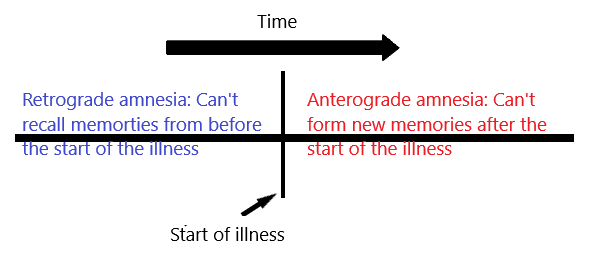Amnesia
Episode #3 of the course Introduction to clinical neuropsychology by Alicia Nortje
Welcome back! So far we have learned about the structure of the brain, and which brain regions are responsible for different psychological processes. From today we’ll look at different neuropsychological syndromes, starting with amnesia.
Definition of Amnesia
The term “amnesia” refers to a group of syndromes marked by a loss of memory. The word “amnesia” comes from the Greek words: “a” means “without”, “mnasthai” means “to remember”, and “ia” means “a condition”.
Memory Difficulties: Retrieving Memories vs. Making Memories
Patients with amnesia cannot make or retrieve memories, but their poor memory performance is not due to reduced intelligence, lack of language skills, attentional problems, or some other explanation. This is important: the failure to make or retrieve memory cannot be attributed to another explanation—and if it can, then it is not true amnesia.
Retrieval problems. Imagine the following: your mind is a library, and your memories are the books. The books might exist, but the library system used to find books is faulty. To help the librarian, you can provide cues, like the author’s name or the title. People with retrieval problems benefit from cues, because they do have memories, but they just can’t find them. Patients with damage to their temporal and frontal lobes behave like this: they make memories, but they struggle to access them. They fail memory tasks because they’re not good at organizing their behavior to solve problems. We’ll talk about this more in Lesson 8.
Formation problems. If however, the books (i.e., the memories) do not exist, then it doesn’t matter how many cues you provide, there is no memory to be found. Patients with damage to their hippocampi behave like this: they can’t make any memories. They will not benefit from cues, because the memory doesn’t exist.
Types of Amnesia: Anterograde vs. Retrograde
Unlike in the movies, not all amnesic patients suddenly lose all their memories after having an accident or illness! Instead, patients can present with either anterograde amnesia or retrograde amnesia.
• With anterograde amnesia, patients cannot form any new memories after the start of their illness/accident; their memories before the start of the illness/accident are preserved.
• With retrograde amnesia, patients cannot remember old memories made before the start of their illness/accident; however, they can form new memories.
Types of Memory
There are three types of human memory:
• episodic memory (memory for personal episodes in your life)
• semantic memory (memory for facts)
• procedural memory (memory for “how” to do something)
Think back to when you learned how to drive a car. Recalling that day and who taught you how to drive a car is episodic. Remembering the rules about how to drive a car is semantic. Knowing how to perform the physical actions of driving a car is procedural.
Memory can also be described as implicit or explicit.
Explicit memory is the conscious recollection/remembrance of previously learned information, for example, being able to remember reading yesterday’s lesson. Explicit memory is contrasted with implicit memory, which refers to the unconscious recollection/recognition of previously learned information. For example, when you see or read something that feels familiar or you “know” the answer, but you can’t remember seeing/reading/learning that information.
For patients with amnesia, semantic memory, procedural memory, and implicit memory are typically intact, but episodic memory and explicit memory are often impaired.
Diseases Associated with Amnesia
Retrograde amnesia is a symptom of Alzheimer’s disease, Herpes Simplex Encephalitis, and sometimes Wernicke-Korsokoff’s syndrome. Anterograde amnesia is a symptom of Wernicke-Korsakoff’s syndrome and Hypoxic episodes where the patient becomes unconscious due to reduced oxygen.
Amnesia is also seen in dementia (like Alzheimer’s disease, Pick’s disease / frontotemporal dementia, vascular dementia, and so forth).
Famous Example: H.M.
H.M. suffered from severe epilepsy. Because epilepsy often occurs in the hippocampus, H.M. underwent surgery to remove both of his medial temporal lobes on 23 August 1958. He was 23 years old. His doctor didn’t realize the consequences of removing H.M.’s temporal lobes: After his surgery, H.M. suffered from severe anterograde amnesia and couldn’t form any new memories. H.M. also demonstrated some retrograde amnesia, which was less severe than his anterograde amnesia. Despite his anterograde amnesia, he was able to learn new motor skills (i.e., procedural memory) but he couldn’t recollect how or when he learned these skills (i.e., no episodic memory). H.M’s amnesia highlighted the important role that the hippocampus plays in the forming of memories.
Conclusion
Today’s topic was amnesia, and we learned how amnesia affects different types of memory systems. We also learned about which diseases are associated with amnesia. To conclude, we learn about the most famous example of amnesia, H.M. Tomorrow, we’ll learn about agnosia!
Until then,
Alicia
Recommended videos
Video of interview with someone with retrograde amnesia
Documentary about a patient with anterograde amnesia
Share with friends


